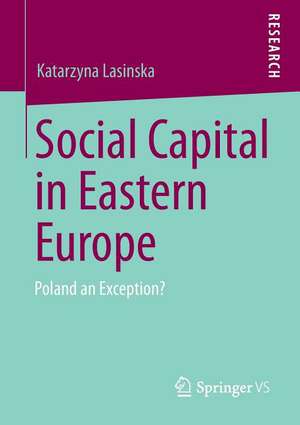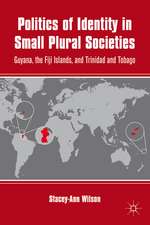Social Capital in Eastern Europe: Poland an Exception?
Autor Katarzyna Lasinskaen Limba Engleză Paperback – 11 ian 2013
Preț: 383.71 lei
Nou
Puncte Express: 576
Preț estimativ în valută:
73.42€ • 80.00$ • 61.87£
73.42€ • 80.00$ • 61.87£
Carte tipărită la comandă
Livrare economică 24 aprilie-08 mai
Preluare comenzi: 021 569.72.76
Specificații
ISBN-13: 9783658005221
ISBN-10: 365800522X
Pagini: 256
Ilustrații: XVII, 238 p. 50 illus.
Dimensiuni: 148 x 210 x 13 mm
Greutate: 0.31 kg
Ediția:2013
Editura: Springer Fachmedien Wiesbaden
Colecția Springer VS
Locul publicării:Wiesbaden, Germany
ISBN-10: 365800522X
Pagini: 256
Ilustrații: XVII, 238 p. 50 illus.
Dimensiuni: 148 x 210 x 13 mm
Greutate: 0.31 kg
Ediția:2013
Editura: Springer Fachmedien Wiesbaden
Colecția Springer VS
Locul publicării:Wiesbaden, Germany
Public țintă
ResearchCuprins
Exploring social capital in Poland.- Social capital: conceptional framework and empirical findings.- Communist legacy and systemic transition.- Catholicism and social capital.- Catholicism and social capital in Poland is a comparative perspective - empirical evidence.- Is social capital building different in Poland?.- Why is Poland an exception among post-communist societies?.
Notă biografică
Katarzyna Lasinska is a lecturer at the Chair for Political Science and International Comparative Social Research, University of Mannheim.
Textul de pe ultima copertă
Katarzyna Lasinska deals with the consequences of democratic transitions in Middle and Eastern Europe. By selecting specific sets of countries according to the main explanations such as Catholic tradition, transformation process and communist legacies, the author identifies key factors explaining particular findings in Poland. Thank to systematically used comparative research strategy the pitfalls of idiosyncratic argumentation are successfully avoided. Through inclusion of religious tradition as an explanative factor the results go beyond the commonly used East-West comparisons. The author presents a comprehensive picture of complex conditions and different processes for social capital building across Eastern European societies.
Contents
· Conceptualisation of social capital in a broad sense: trust, social networks and norms and values
· Comparative study of Eastern European societies
· Analysis of social capital building in post-communist societies
· Quantitative analysis of the impact of religious tradition on social capital building
· Factors explaining specific findings concerning low stock of social capital in Poland are identified
Target groups
· Scholars and students in the political sciences, political sociology, sociology of religion, comparative politics
· International and national NGOs, civil society players, Policy-makers, social networks activists, journalists and political analysts
Author
Katarzyna Lasinska is a lecturer at the Chair for Political Science and International Comparative Social Research, University of Mannheim.
Contents
· Conceptualisation of social capital in a broad sense: trust, social networks and norms and values
· Comparative study of Eastern European societies
· Analysis of social capital building in post-communist societies
· Quantitative analysis of the impact of religious tradition on social capital building
· Factors explaining specific findings concerning low stock of social capital in Poland are identified
Target groups
· Scholars and students in the political sciences, political sociology, sociology of religion, comparative politics
· International and national NGOs, civil society players, Policy-makers, social networks activists, journalists and political analysts
Author
Katarzyna Lasinska is a lecturer at the Chair for Political Science and International Comparative Social Research, University of Mannheim.
Caracteristici
Publication in the field of social sciences













